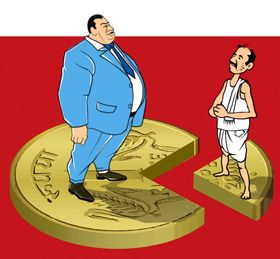I happened to be a Union cabinet minister when Dr Manmohan Singh had his most spectacular achievement: GDP grew at 9.4 per cent, the highest rate ever and unbeaten since then. While the prime minister and Indian public opinion (particularly big business) were congratulating themselves on having broken the shackles of four decades of the so-called “licence-permit raj” and were eagerly anticipating double digit GDP growth to give China a run for its money, I got myself into deep trouble with the PM and the party by remarking at a meeting that 9.4 per cent GDP growth meant only that 94 per cent of Indians had grown at 0.94 per cent, while the fat cats who constitute 0.94 per cent of our population had grown by 9,400 per cent! It was clearly something of an off-colour joke at what I thought was a confidential get-together to discuss corporate linkages with panchayats, the portfolio I was handling. My remarks were leaked a few days later to the press and inevitably there was a huge rumpus leading to my being reprimanded at the highest levels in no uncertain terms.
I am, therefore, relieved (if deeply disturbed) that the World Inequality Database has revealed that three decades of liberalisation have humongously increased inequality. Between the regimes of Jawaharlal Nehru and P.V. Narasimha Rao, the share in national income of the “top 1 per cent”, which in colonial times had peaked at 21 per cent, shrank by the early 1980s to just 6 per cent. At the start of the reforms, the gap in national income share between the “top 10 per cent” and the “bottom 50 per cent” was 11 per cent (down from 16 per cent in 1951). Post reforms, it soared to 42.7 per cent in 2022, with the top 10 per cent claiming nearly 58 per cent of national income. Reforms also helped the “top 1 per cent” to more than double their national income share to nearly 23 per cent. The bottom 50 per cent now gets only 15 per cent of the pie. This is clearly in violation of the preambular pledge in the Constitution to “equality, of status and opportunity” and “justice, social, economic and political”, besides the Directive Principle in Article 38(2): “The State shall, in particular, strive to minimise the inequalities in income.” The Narendra Modi government, desperate for a Uniform Civil Code, is in blatant violation of the far more relevant Directive Principle relating to income inequality by endeavouring to maximise, not “minimise inequalities in status, facilities and opportunities”.
We may have attained the global fifth position in overall national income but are floundering at virtually the bottom on global indices that measure levels of justice in the distribution of the wealth of the nation. It was not for Adani and Ambani and others of the “suit-boot” gang that we won our freedom. Yet, in complete contrast with the goals of our Independence struggle and our constitutional injunctions, “India,” under the Modi dispensation says JNU emeritus professor, Aditya Mukherjee, “is witnessing obscene levels of inequality”, with the top 0.1 per cent capturing 9.6 per cent of national income—almost to the last decimal point what I had foretold as a minister.
While the incomes of the richie-rich have risen to stratospheric levels, there is the parallel tragedy of “stagnancy in income growth among the majority of the population” (World Inequality Database). Add to this the rampant unemployment among “casual labour”, the most deprived segment of our society, which plummeted from a share of employment of 28 per cent among men and women in 2011-12 to a dismal 23 per cent for men and a woeful 17 per cent for women in 2022-23.
In consequence, a clear nexus emerges between wealth and political power, symbolised by Ambani securing from the government the conversion of a defence airport into an international airport for 10 days to facilitate a celebrity family event. Would this ever have happened for any other Indian (other, of course, than Adani)? So long as money makes the mare go round, there can be no elimination of “inequalities in status, facilities and opportunities” which was the solemn constitution duty laid down by our founding fathers.
All of which explains why I remain an unreconstructed Nehruvian socialist.
Aiyar is a former Union minister and social commentator.


